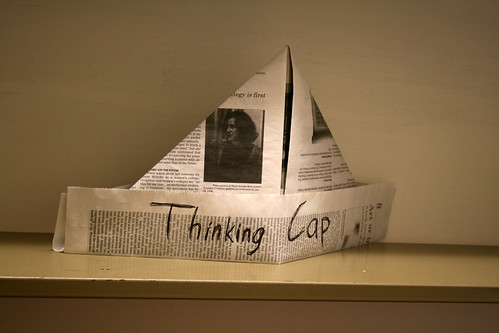 The phrase comes up regularly in patient care: "There is not one treatment approach that will work for all patients". This then leads to the inevitable perceived need for an "eclectic treatment approach".
The phrase comes up regularly in patient care: "There is not one treatment approach that will work for all patients". This then leads to the inevitable perceived need for an "eclectic treatment approach".
Of course, the more "tools in your toolbox", the better a clinician you are believed to be. Ugh.
I hear this regularly in both clinical and educational settings. You know what? I disagree. Completely. There is one approach that applies to all patients. It is highly effective, and it is critical to clinical success.
It's name? Science - and more specifically, clinical reasoning and critical thinking.
“Man is so intelligent that he feels impelled to invent theories to account for what happens in the world. Unfortunately, he is not quite intelligent enough, in most cases, to find correct explanations. So that when he acts on his theories, he behaves very often like a lunatic.” (Aldous Huxley)
The problem begins when you view patient care as a series of treatment interventions applied to specific pathologies. If you view the clinical world like this - "do treatment A for problem B" - then one approach won't fit all. You are ultimately limited by your ability to align treatment A with problem B. The breadth and scope of knowledge regarding varieties of treatment interventions is self-limiting.
There is, in fact, one approach that provides a foundation for ALL treatment approaches: sound, science-based clinical reasoning and principles of assessment, combined with some sound logic and critical thinking.
One approach to all patients requires an ability to gather relevant information given the context of the patient scenario. This occurs via the clinician's ability to ask the appropriate questions utilizing appropriate communication strategies. Sound critical thinking requires the clinician to hold their own reasoning processes to scrutiny in an attempt to minimize confirmation bias if at all possible. It also requires the clinician to have a firm regard for the nature of "normal" and the statistical variations that occur while adapting to the demands of life on planet earth.
“Most of you will have heard the maxim "correlation does not imply causation." Just because two variables have a statistical relationship with each other does not mean that one is responsible for the other. For instance, ice cream sales and forest fires are correlated because both occur more often in the summer heat. But there is no causation; you don't light a patch of the Montana brush on fire when you buy a pint of Haagan-Dazs.” (Nate Silver)
It doesn't stop there. Science provides a platform for assessment reliability and validity. Scientific plausibility provides a foundation for the accepting (or refuting) of a treatment approach.
From this platform, we can derive any and all treatment approaches that have the potential to withstand the rigors of science and critical thinking. Build in some basic principles underlying biomechanics, cellular physiology, and neurophysiology and you now have all you need to succeed.
"Science" doesn't require "eclectic". It demands critical thinking - something that we should promote (and demand) from entry-level education through continuing education. Our treatment interventions would become far more consistent, and our patients would be thankful for it.
Photo credits: quinn.anya
 "Running Injuries: Etiology And Recovery- Based Treatment" (co-author Bridget Clark, PT) appears in the third edition and fourth editions of "Clinical Orthopaedic Rehabilitation: A Team Approach" by Charles Giangarra, MD and Robert C. Manske, PT.
"Running Injuries: Etiology And Recovery- Based Treatment" (co-author Bridget Clark, PT) appears in the third edition and fourth editions of "Clinical Orthopaedic Rehabilitation: A Team Approach" by Charles Giangarra, MD and Robert C. Manske, PT.
 Allan Besselink, PT, DPT, Ph.D., Dip.MDT has a unique voice in the world of sports, education, and health care. Read more about Allan here.
Allan Besselink, PT, DPT, Ph.D., Dip.MDT has a unique voice in the world of sports, education, and health care. Read more about Allan here.
 Top 5 finalist in three categories: "Best Overall Blog", "Best PT Blog" and "Best Advocacy Blog".
Top 5 finalist in three categories: "Best Overall Blog", "Best PT Blog" and "Best Advocacy Blog".